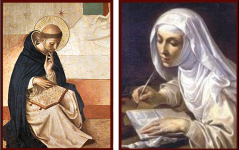Below you will find a selection of quotations. Each week of Lent we invite you to select and reflect on one of the quotations.
Thomas Aquinas (13th cent.)
Grant me, O Lord my God,
a mind to know you,
a heart to seek you,
wisdom to find you,
conduct pleasing to you,
faithful perseverance in waiting for you,
and a hope of finally embracing you. Amen.
Meister Eckhart (13th cent.)
We should understand love from the simile of the fire and we should understand the Holy Spirit from the simile of the wind with respect to the activity of the Holy Spirit in the soul. The greater love there is in the soul and the more strongly the Holy Spirit blows, all the more perfect is the fire.
In Matthew Fox, Breakthrough: Meister Eckhart’s Creation Spirituality in New Translation, 373.
Catherine of Siena (14th cent.)
Eternal goodness,
you want me to gaze into you
and see that you love me,
to see that you love me gratuitously,
so that I may love everyone
with the very same love.
In Mary O’Driscoll, Catherine of Siena: Passion for the Truth, Compassion for Humanity: Selected Writings, 71.
Catherine of Siena (14th cent.)
Self-knowledge is the bedrock on which Catherine builds her theology and spirituality…. To her, this knowledge of self and God is not simply the result of an intellectual journey; it is rather the kind of knowledge that is fed through the loving affection of an abiding friendship.
In Shelley Emling, Setting the World on Fire: The Brief, Astonishing Life of St Catherine of Siena, 142-43.
Edward Schillebeeckx (20th cent.)
I believe in the Holy Spirit, who is the Lord and gives life.
And for the prophets among us, the Spirit is language, power and fire.
I believe that together we are all on a journey,
pilgrims called and gathered together to be God’s holy people,
for I confess freedom from evil,
the task of bringing justice
and the courage to love. See God Among Us: The Gospel Proclaimed, 90.
Mary O’Driscoll (20th cent.)
“There is a false form of contemplation that seeks tranquillity of inner peace as an end in itself. Such contemplation seeks to avoid anything that hinders its tranquil resting in God’s presence. It seems indeed to act as a kind of drug which insulates the person who engages in it from the horror of the pain and suffering of the world. Such a type of contemplation obviously will not lead to action, especially action on behalf of the unjustly suffering in our world…. This cannot be Christian contemplation for Christian contemplation is an encounter with God in Jesus Christ. It is an encounter with God who loved the world so much that God sent God’s son into it. Because of the Incarnation then, the world is the focal point of God’s self-revelation to us. That is where we have to meet Him…. Christian activity … opens us to contemplation, just as Christian contemplation opens us to liberating praxis.”
In Mary O’Driscoll, “Dominican Spirituality: Contemplative Involvement in the World,” New Jersey, Parable Conference Proceedings Justice and Truth Shall Meet, (1984):130-33.
Timothy Radcliffe (20th cent.)
“Surely, we anticipate our rest in God not just by stopping work, but in the quality of our mutual presence? We need moments of leisure where we serenely let ourselves be naked before God and in the eyes of those whom we love. It takes time to unveil ourselves, to let ourselves be seen in our complexity and our contradictions. You cannot show yourself in a moment. We need moments of Sabbath with each other, with our families, our friends, our religious communities, when we can edge into visibility, confident of a merciful regard. . . To be loved is to be seen in a certain way; as more than useful, more than entertaining, and more than desirable. It is to be seen not as an object but as a subject, as one who returns the gaze as well.”
See ‘Without the Day of the Lord, we cannot Live’ in What is the Point of Being a Christian? 207.
Donald Goergen (21st cent)
“To be contemplative means ‘to live in the temple’ . . . or, if we were to borrow from Dominic’s son Eckhart, to live in the ground of one’s soul, to be grounded, to be centred, or perhaps to stay with St Paul, whom Dominic so loved, to live in the temple but realize that ‘you are God’s temple. . . and God’s temple is holy, and you are that temple’ (1 Cor 3:16-17). In other words, being contemplative does not necessarily mean withdrawal from the world, a life devoid of pastoral concerns, or a less apostolic life. Dominic was an itinerant contemplative.”
See St Dominic: The Story of a Preaching Friar, 107.
A Dominican Blessing (traditional)
May God the Father bless us,
May God the Son heal us,
May the Holy Spirit enlighten us and give us eyes to see with,
ears to hear with,
and hands to do the work of God with,
feet to walk with,
and a mouth to preach the word of salvation with,
and the angel of peace to watch over us and lead us at last,
by our Lord’s gift to the kingdom, Amen.








